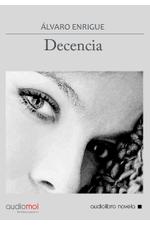Blog del Instituto Cervantes de Dublín
Torre Martello
Cine de suspense y terror / Thriller and horror films
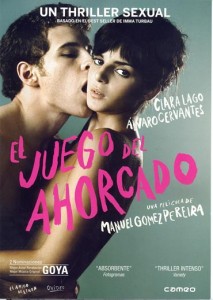 Hoy finaliza nuestro ciclo de cine Puntos suspensivos con la película de Manuel Gómez Pereira El juego del ahorcado. Pero el buen cine negro, de suspense y terror, siempre tiene un lugar de honor en nuestra biblioteca. Estos meses de noviembre y diciembre más que nunca, porque precisamente son títulos de este género los que hemos seleccionado como tema del mes para finalizar el año.
Hoy finaliza nuestro ciclo de cine Puntos suspensivos con la película de Manuel Gómez Pereira El juego del ahorcado. Pero el buen cine negro, de suspense y terror, siempre tiene un lugar de honor en nuestra biblioteca. Estos meses de noviembre y diciembre más que nunca, porque precisamente son títulos de este género los que hemos seleccionado como tema del mes para finalizar el año.
Si no pudiste asistir a la proyección de películas como Abre los ojos, REC, Mientras duermes o No habrá paz para los malvados, ahora tienes la oportunidad de verlas en nuestra biblioteca junto a otros títulos como Los otros, Cámara oscura, Frágiles, Buried o La noche de los girasoles. Películas, todas ellas, que no te dejarán quedarte dormido. Durante mucho tiempo.
Our Fear Factor Film Season finishes today with the film screening of The Hanged Man by Manuel Gómez Pereira. But the best Spanish thrillers and horror films have always a place of honor in our library. Now more than ever, as this kind of films are precisely the ones we have selected as topic of the month in the library during November and December.
So, if you could not attend the screening of films like Open your eyes, REC, Sleep Tight or No rest for the wicked, now is your chance to watch them in our library along with other titles like Fragile, Buried or The Night of the Sunflowers. Movies, all of them, that will not let you fall asleep. For a long time.
Damià Timoner, Sòlid / Damià Timoner in Dublin
Sòlid es el nombre de la gira que Damià Timoner está realizando por Irlanda. Al concierto de hoy en el Instituto Cervantes de Dublín, se sumarán dos más en Sligo los días 9 y 10 de noviembre. Sòlid es también el nombre del último de sus ocho discos, en el que nos ofrece una fusión entre el sonido mediterráneo de la guitarra española y las influencias musicales de toda su generación: el pop/rock anglosajón de los 70 y los sonidos instrumentales de la costa oeste americana de los 80.
Su página web ofrece una buena muestra de su trabajo, con pistas de audio y video de algunas de sus composiciones y versiones. Aquí os dejamos una, «The Dead Covers Project». Que lo disfrutéis. Ya sabéis, esta tarde, a las 7:30.
Sòlid is the name of Damià Timoner’s tour in Ireland. Today’s concert at the Instituto Cervantes Dublin will be followed by two more in Sligo, on 9th and 10th November. Sòlid is also the name of the last of his eight albums which offers a fusion of the Mediterranean sound of the Spanish guitar and the musical influences of his generation: the pop / rock of the 70’s and the instrumental sounds of the American West Coast of the 80’s.
His website provides a good sample of his work, with audio and video tracks of some of his compositions and versions. Here you have one, “The Dead Covers Project”. Enjoy it, and enjoy the concert. Today, 7:30pm.
Concierto de Salvador Andrades en el Cervantes de Dublín / Salvador Andrades in concert
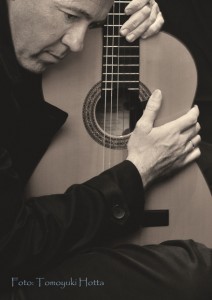 Salvador Andrades, guitarrista gaditano, alumno de Antonio Sánchez, padre de Paco de Lucía, ofrecerá un concierto en nuestro Café Literario el próximo día 18 de noviembre.
Salvador Andrades, guitarrista gaditano, alumno de Antonio Sánchez, padre de Paco de Lucía, ofrecerá un concierto en nuestro Café Literario el próximo día 18 de noviembre.
Salvador ha trabajado junto a artistas como Camarón de la Isla, Fosforito o Tomatito y ha participado como músico en varias películas, entre ellas The mask of Zorro bajo la dirección musical de James Horner.
En este concierto, Salvador Andrades interpretará sus propias composiciones, impregnadas de músicas como el jazz y la bossa nova. ¡Ya puedes comprar tu entrada en reservas.dublin@cervantes.es! Solo cuesta 10 euros.
Salvador Andrades, guitarist from Cadiz, will offer a unique concert in our Café Literario on the 18th November.
Salvador studied guitar with Antonio Sánchez, Paco de Lucia’s father. He has worked with artists such as Camarón de la Isla, Tomatito and Fosforito. As a musician, he has participated in several movies, including The Mask of Zorro, under the musical direction of James Horner.
In this concert, Salvador Andrades will play his own compositions, steeped in music like jazz and bossa nova. Now, you can buy your ticket at reservas.dublin@cervantes.es. It’s only 10 euros!
18/11 a las 7.30pm, Café Literario
Entradas: €10,
reservas.dublin@cervantes.es
Preparando el Festival Isla 2014 / Preparing Isla Festival 2014
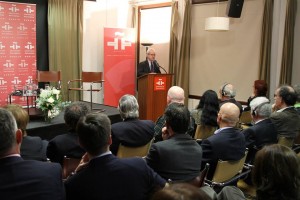 Durante este fin de semana, hemos celebrado la segunda edición del Festival Isla de Literatura. Por segundo año consecutivo, Irlanda, Latinoamérica y España se encontraron en el Instituto Cervantes de Dublín para hablar de la literatura y sus alrededores.
Durante este fin de semana, hemos celebrado la segunda edición del Festival Isla de Literatura. Por segundo año consecutivo, Irlanda, Latinoamérica y España se encontraron en el Instituto Cervantes de Dublín para hablar de la literatura y sus alrededores.
Una vez más, queremos agradecer desde aquí el apoyo y la colaboración de instituciones como Dublin UNESCO City of Literature, Ireland Literature Exchange, el Instituto Vasco Etxepare, Poetry Ireland, y cómo no, a la inestimable aportación de Dublin City University, National University of Ireland in Galway, National University of Ireland in Maynooth. Trinity College Dublin, y University College Cork. Muchísimas gracias a todos ellos.
Como dijera Rosa León, directora del Instituto Cervantes de Dublín durante su discurso de inauguración, «tenía que ser aquí, en esta isla esmeralda, donde naciera y creciera nuestro festival, donde la semilla de nuestro esfuerzo diera sus frutos. En esta misma tierra donde tantos genios de la literatura cavaron antes con su pluma para fecundarla y enriquecerla, para hacerla abierta, acogedora y libre.
Porque la gran riqueza de Irlanda es su cultura y su maravillosa tradición literaria, y esa poderosa fuerza se da la mano aquí, en este festival, con la fuerza del español, con quinientos millones de seres humanos en cuatro continentes, con la segunda lengua de comunicación a nivel internacional».
Rosa León recordó también las hermosas palabras del presidente Michael D. Higgins durante su discurso en 2012 y, como no, tuvo de palabras de cariño y reconocimiento hacia Seamus Heaney, cuya presencia estaba prevista en el festival desde antes del verano. Sus poemas, los mismos que él había elegido para su lectura durante el Festival Isla, se hicieron presentes en la sala gracias a la voz del actor irlandés Tom Hickey.
Finalmente, Rosa León cedió la palabra a otro gran amigo de Seamus y del propio Instituto Cervantes, el gran escritor irlandés John Banville, que «de forma amabilísima y desinteresadamente atendió la llamada del Instituto Cervantes para cubrir la ausencia de Seamus Heaney».
John Banville, en su intervención, recordó la impresión que le había causado, en su primera visita a España, un hombre a caballo en la isla de Mallorca. También recordó su visita a América del Sur para visitar la casa de la madre de Thomas Mann y nos hizo reflexionar, de este modo, sobre la universalidad de la literatura. Muchísimas gracias, John, por tu generosidad.
Esperamos que todos hayais disfrutado del Festival y esperamos también recibir vuestras sugerencias y aportaciones, para mejorar en lo que sea posible en la edición del Festival Isla de 2014 que hoy mismo comenzamos a preparar.
Las fotos del festival están ya disponibles en nuestra página de Facebook.
Los vídeos del Festival estarán muy pronto disponibles en nuestro canal de Youtube.
During last weekend , we celebrated the 2nd Isla Literary Festival . For the second year in a row , Ireland , Latin America and Spain joined at the Instituto Cervantes in Dublin to talk about literature and its surroundings.
Once again , we thank the support and collaboration of institutions such as Dublin UNESCO City of Literature, Ireland Literature Exchange , Instituto Vasco Etxepare, Poetry Ireland, and of course, the invaluable contribution of Dublin City University, National University of Ireland in Galway, National University of Ireland in Maynooth, Trinity College Dublin, and University College Cork. Many thanks to all of them.
As Rosa Leon, director of Instituto Cervantes in Dublin, said during her speech , “our Festival had to be born in here , in the Emeral Isle. On this same land where many geniuses of literature dug with their pens to fertilize and to enrich it , to make it an open land, free and welcoming.
Because the rich of Ireland is its culture and its wonderful literary tradition, and that powerful force joins hands here, in this festival, with the strength of the Spanish language, with half a billion of human beings on four continents , with the second language of international communication.”
Rosa Leon recalled as well the beautiful words of President Michael D. Higgins during his speech in 2012 and she had words of love and gratitude to Seamus Heaney, whose presence was expected at the Festival since before summer . His poems , the same poems he had chosen for reading during the Isla Festival, were present in the official opening thanks to the voice of the Irish actor Tom Hickey.
Finally , Rosa León gave the floor to another great friend of Seamus and Instituto Cervantes , the great Irish writer John Banville , who “so lovable and unselfishly answered our call to cover the absence of Seamus Heaney.”
John Banville recalled the impression that a man riding a horse in Mallorca made on him during his first visit to Spain. He also mentioned his trip to South America, to visit the house of Thomas Mann‘s mother and, in this way, he made us reflect on the universality of literature. Thank you , John , for your generosity .
We hope you all have enjoyed the Festival as much as we did, and we look forward to receiving your suggestions and contributions to improve, as best as we can, the 3rd edition of our Isla Festival that we start preparing today.
The photos of the Isla Festival 2013 are now available on our Facebook page .
The videos of the interviews we prepare will soon be available on our YouTube channel.
No solo de mesas vive el Festival Isla de Literatura / It’s not just about round table discussions
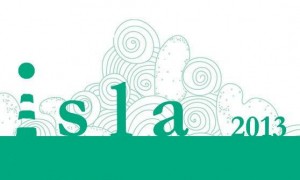 No, en el Festival Isla no solo hay mesas redondas.
No, en el Festival Isla no solo hay mesas redondas.
A lo largo de las últimas semanas hemos estado desgranando en estas páginas los detalles de las mesas redondas que conforman el Festival Isla de Literatura. Pero nuestro festival es mucho más que eso, porque además tendrás la oportunidad de asistir a lecturas en inglés y en español de textos de poesía y narrativa, leídos por sus propios autores, tendrás la posibilidad de comprar sus libros, y tendrás la ocasión de tomarte un café y un tentempié en nuestra sala de exposiciones. Allí mismo podrás encontrarte con los autores que participan en el evento y pedirles que firmen tu ejemplar.
Disfruta de la literatura, en todos los sentidos, en compañía de René Vázquez, Daniel Freidemberg, Tomás Mac Síomóin, Paula Meehan, Kirmen Uribe, Enrique Vila-Matas, John Banville, Eileen Battersby, John Boyne, Julio Espinosa, Álvaro Enrigue, María Tena, Fernando Sánchez Dragó, Marina Carr, Susana Cella y Manuel Gutiérrez Aragón. Estás avisado. ¡Allá tú si te lo pierdes!
No. Isla Festival of Literature is not just about round table discussions.
Over the last few weeks, we have been showing in these pages the details of the round table discussions that will be held during our Festival Isla of Literature. But our festival is much more than that, because you will also have the opportunity to join our readings of poetry and fiction, with texts read by the authors themselves. You will have the occasion to buy their books, and to take a coffee and a snack in our exhibition room. Right there, you can meet the authors participating in the event and ask them to sign your copy.
Enjoy the best literature in the company of René Vázquez, Daniel Freidemberg, Tomás Mac Síomóin, Paula Meehan, Kirmen Uribe, Enrique Vila-Matas, John Banville, Eileen Battersby, John Boyne, Julio Espinosa, Álvaro Enrigue, María Tena, Fernando Sánchez Dragó, Marina Carr, Susana Cella and Manuel Gutiérrez Aragón. You are warned! Don’t miss it!
También hablamos de género en el Festival Isla 2013 / A Question of Genres: Isla Literary Festival 2013
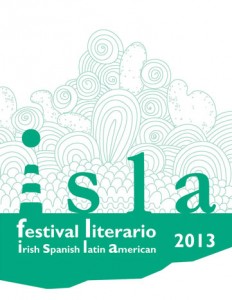 Entramos en la recta final. Llegamos a la semana en la que comienza, este mismo viernes, el Festival Isla de Literatura 2013.
Entramos en la recta final. Llegamos a la semana en la que comienza, este mismo viernes, el Festival Isla de Literatura 2013.
Precisamente en la recta final del festival, en la última mesa redonda que se celebrará el domingo día 20, contaremos con la presencia de Marina Carr, Susana Cella y Manuel Gutiérrez Aragón. Con ellos, Jean Philippe Imbert, profesor de DCU y experto en la materia, hablaremos de géneros. No solo de géneros literarios. También de género sexual. Géneros que tienden a mezclarse, a fundirse, a buscarse y, a menudo, a pelearse entre ellos.
¿Hay un género que domine sobre los demás, que ejerza su poder opresor sobre los otros?, ¿existe un género rey (o reina), o son todos igualmente necesarios? Estas y otras preguntas, y también algunas de sus respuestas, el domingo día 20, a partir de las once de la mañana.
We are now entering the stretch, very close to the beginning of the Isla Literary Festival, this Friday,18th October, 4:00pm.
Precisely, at the end of the Festival, in the last round table discussion to be held on Sunday 2oth, we will receive Marina Carr, Susana Cella and Manuel Gutiérrez Aragón. With them, Jean Philippe Imbert, DCU professor, we will talk about genres.
Genres that tend to overlap, get together, blur lines but, more often, clash with each other. Is there a single genre that dominates the rest and exerts its oppressive power over others? Is there a genre King (or Queen) or are they all equally important? These and other interesting questions, (and maybe some of the answers, who knows!) next Sunday, starting at eleven o’clock in the morning.
Dublin and other Cities of Literature / Dublín y otras ciudades de la literatura
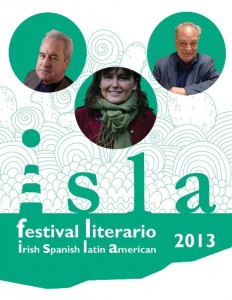 “Dublin and other Cities of Literature” is the title of the second round-table discussion in our Isla Literary Festival 2013. With John Banville, Eileen Battersby and Enrique Vila-Matas, we will travel from 1950s Dublin, reflected in Benjamin Black´s Vengeance to the modern-day Dublin of Enrique Vila-Matas and Dublinesca, through cosmopolitan landscapes, remote in space and time, inhabited by the characters of John Banville.
“Dublin and other Cities of Literature” is the title of the second round-table discussion in our Isla Literary Festival 2013. With John Banville, Eileen Battersby and Enrique Vila-Matas, we will travel from 1950s Dublin, reflected in Benjamin Black´s Vengeance to the modern-day Dublin of Enrique Vila-Matas and Dublinesca, through cosmopolitan landscapes, remote in space and time, inhabited by the characters of John Banville.
What does it mean to be a City of Literature?
Uno de los platos fuertes de nuestro Festival Isla 2013 será sin duda la mesa redonda protagonizada por John Banville, Eileen Battersby y Enrique Vila-Matas. Con ellos viajaremos desde el Dublín de los años 50, que aparece reflejado en Venganza, de Benjamin Black, hasta el Dublín moderno de Enrique Vila-Matas y su Dublinesca, pasando por los paisajes cosmopolitas, distantes en el espacio y en el tiempo, habitados por los personajes de John Banville.
Juan José Manzano
 Juan José Manzano is an Andalusian-born Flamenco guitar player. José’s own compositions and improvisations bring you closer to the purest form of Flamenco Guitar with sounds from the Bay of Cadiz.
Juan José Manzano is an Andalusian-born Flamenco guitar player. José’s own compositions and improvisations bring you closer to the purest form of Flamenco Guitar with sounds from the Bay of Cadiz.
He is mainly influenced by the purest Flamenco artists and has performed across Andalusia for over 15 years. Juan José is now living in Ireland and his music reflects an influence of world music with gentle personal touches that remind us of the tranquility of the fishing white washed villages of Southern Spain.
He will be at Instituto Cervantes in Dublin next Thursday, 26th September, from 7:30pm.
Juan José Manzano es un guitarrista flamenco nacido en Andalucía. Por medio de sus composiciones e improvisaciones, José nos acerca a la más pura guitarra flamenca con aires gaditanos.
La influencia de Juan José proviene fundamentalmente de los artistas del flamenco más puro. Ha tocado por toda Andalucía durante más de 15 años y ahora vive en Irlanda. Su música refleja una influencia de las músicas del mundo con toques más dulces y personales que nos recuerdan la tranquilidad de los pueblos blancos marineros del sur de España.
Juan José Manzano estará con nosotros el próximo jueves, 26 de septiembre, a partir de las 7:30 de la tarde.
Audiobooks of the week / Audiolibros de la semana: Álvaro Enrigue
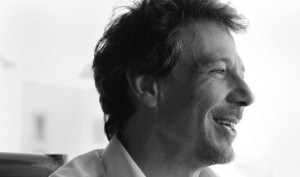 Have you heard about Alvaro Enrigue?
Have you heard about Alvaro Enrigue?
If not, this is a very good chance to start reading and listening his books, because Álvaro Enrigue will be with us during the Isla Festival of Literature that will take place at the Instituto Cervantes from the 18th until the 20th October.
Álvaro Enrigue is one of the most celebrated young Mexican writers at the moment. He has been professor of Literature at the Ibero-American University in Mexico and of Creative Writing in Maryland. Currently, he lives in New York, where he was chosen as resident writer by the New York Public Library in 2011-2012.
During our Isla Literary Festival, he will participate in a round table discussion on Saturday and he will read a selection of his work. Are you going to miss it?
In our Audiobooks platform, you can find two novels written by him.
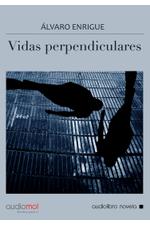
In Vidas Perpendiculares Álvaro Enrique tells us about the life of Jerónimo Rodríguez Loera. He looks apparently like a typical mexican boy, but he is able to feel his father’s fears when he is close to him, and to remember all his past lives.
If you prefer reading than listening, there is a printed version of this book available in our library.
In Decencia you can listen the story of two Mexican guerrilleros in 1973. They kidnap an important bussiness man, Longinos Brumell. When they arrive to Mexico city, a bomb explodes near the consulate of the United States in Guadalajara. This explosion will change completely the whole story.
But you still have one more option. If you prefer shot stories rather than novels, you can also download Hipotermia, a collection published for the firt time in 2004. All these posibilities are just one click away from you. Enjoy them!
¿Conoces ya la obra de Álvaro Enrigue?
Si no es así, ahora es el momento, porque Álvaro estará con nosotros en el Festival Isla de Literatura que se celebrará en el Instituto Cervantes desde el día 18 hasta el 20 de octubre.
Álvaro Enrigue, nació en 1969, es uno de los jóvenes escritores mexicanos más destacados de los últimos años y fue seleccionado por la New York Public Library como escritor residente en 2011-2012. Durante nuestro Festival Isla participará en la mesa redonda titulada «Poder Hispano». ¿Te lo vas a perder?
En la plataforma de descarga de audiolibros de nuestra biblioteca tienes a tu disposición dos novelas de este autor: Vidas perpendiculares y Decencia publicadas en 2008 y 2011 respectivamente.
Hoy, por ello, no te proponemos uno sino dos audiolibros de la semana.
 En Vidas perpendiculares, el autor Álvaro Enrigue nos cuenta la historia de Jerónimo Rodríguez, cuyos rasgos físicos son iguales a los de un típico chico mexicano. Sin embargo, al mismo tiempo, Jerónimo tiene la habilidad de sentir los miedos de su padre cuando está cerca de él, y puede recordar cuáles eran sus sentimientos cuando vivía con una tribu prehistórica o cuando vivía en el siglo XVII en Italia. El autor escribe todas estas vidas pasadas y la presente con un nexo de unión entre todas, la búsqueda del amor.
En Vidas perpendiculares, el autor Álvaro Enrigue nos cuenta la historia de Jerónimo Rodríguez, cuyos rasgos físicos son iguales a los de un típico chico mexicano. Sin embargo, al mismo tiempo, Jerónimo tiene la habilidad de sentir los miedos de su padre cuando está cerca de él, y puede recordar cuáles eran sus sentimientos cuando vivía con una tribu prehistórica o cuando vivía en el siglo XVII en Italia. El autor escribe todas estas vidas pasadas y la presente con un nexo de unión entre todas, la búsqueda del amor.
Si lo prefieres, la versión impresa de este libro también está a tu disposición en nuestra biblioteca.
En Decencia conoceremos la historia de dos guerrilleros mexicanos que secuestran en 1973 a un importante hombre de negocios, Longinos Brumell, quien los ayudará a viajar hasta ciudad de México. Cuando llegan a la capital, de repente, una bomba explota en el consulado de los Estados Unidos en Guadalajara. Esta explosión cambiará por completo el desarrollo de toda la historia.
Y aún te ofrecemos una opción más. Si lo que te gusta son los cuentos, también puedes descargarte Hipotermia, un libro de relatos publicado por primera vez en 2004
Todos ellos están a tu disposición, a un clic que distancia. ¡Que los disfrutes!
Exposición: Carteles de cine cubanos | Exhibition: Cuban Film Posters
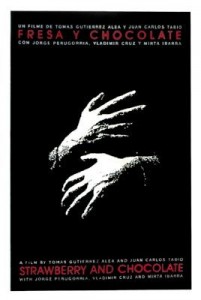 Empezamos nuestra programación cultural de año con un plato fuerte: una fantástica exposición de carteles de cine cubano que podrás disfrutar en nuestra Sala de Exposiciones del 16 al 31 de enero. El horario de visita de la exposición es de lunes a jueves de 14:00 a 19:00 y los sábados de 10:00 a 14:00.
Empezamos nuestra programación cultural de año con un plato fuerte: una fantástica exposición de carteles de cine cubano que podrás disfrutar en nuestra Sala de Exposiciones del 16 al 31 de enero. El horario de visita de la exposición es de lunes a jueves de 14:00 a 19:00 y los sábados de 10:00 a 14:00.
El Instituto Cubano de Arte e Industria Cinematográficos (ICAIC), el instituto del cine cubano, fue fundado en 1959; su objetivo es promover el medio del cine a través de una amplia gama de actividades, incluida la producción de cine y televisión. El ICAIC también presenta cada año a través de toda Cuba numerosas proyecciones de películas de producción local e internacional. Y para cada una de ellas se crea un cartel único, diseñado por un artista gráfico cubano.
El ICAIC imprime la mayoría de sus carteles de cine diseñados originalmente, como serigrafías en formato de 20×30 pulgadas. Estos carteles se distribuyen por toda Cuba y destacan el importante papel que el cine y las artes visuales desempeñan en la actualidad cubana.
Los carteles se hacen totalmente a mano. En el proceso de serigrafía, se corta un plano individual para cada color. Cada color se aplica individualmente y toma 24 horas en secarse antes de que se pueda aplicar el siguiente color.
Esta es una exhibición única, que se presenta al público irlandés coincidiendo con la Muestra de Cine Cubano, como parte de las celebraciones del Día Nacional de Cuba, del 16 al 31 de enero de 2013.
Our cultural activity for the new year is starting this week with the opening of a great exhibition of Cuban Film Posters. You will be able to enjoy it in our Exhibition Room from 16-31 January. These are the opening hours: Mon-Thur 2-7pm, Sat 10am-2pm.
The Instituto Cubano de Arte e Industria Cinematográficos (ICAIC), the Cuban film institute, was established in 1959; it aims to promote the medium of film through a range of diverse activities including film and television production. ICAIC also presents numerous screenings of locally produced and international films throughout Cuba each year. And for each, a unique poster is created by a Cuban graphic artist.
ICAIC prints the majority of its originally designed film posters as silk-screens in a 20×30 inch format. These posters are widely distributed across Cuba, and highlight the important role that cinema and the visual arts play in contemporary Cuban life.
These posters are totally handmade. In the silk-screen process a screen is hand cut for each individual colour. Each colour is applied separately. Each colour takes 24 hrs to dry before the next can be applied. This is a unique exhibition presented to the Irish public coinciding with the Cuban Film Season, as part of the celebrations of the National Day of Cuba, from 16-31 January 2013.
[Video] Elena Durán en el Instituto Cervantes de Dublín
Elena Durán es una de las flautistas más carismáticas en el mundo. Ha ofrecido conciertos y ha grabado discos con muchas de las orquestas más prestigiadas del Reino Unido, Europa y Estados Unidos, así como con prácticamente todas las orquestas importantes de México. En esta entrevista realizada por Irene, compañera de la Embajada de México en Irlanda, nos cuenta su trayectoria. Edición de video: Cris Méndez.
Elena Durán is one of the most charismatic flute players in the world today. She has made concerto appearances and recordings with many major orchestras in the UK, Europe, the United States and with virtually every orchestra in Mexico. In this video, Elena told us about her musical career. Interviewed by Irene. Video edited by Cris Méndez.
[Video] Entrevista a Juan Gabriel Vásquez / Interview with Juan Gabriel Vásquez
Juan Gabriel Vásquez es uno de los mejores novelistas de su generación, y El ruido de las cosas al caer, que aborda el devenir de Colombia durante la época de Pablo Escobar, es una de sus grandes novelas.
El pasado mes de noviembre, tuvimos la suerte de recibir a Juan Gabriel Vásquez en el Instituto Cervantes de Dublin, donde presentaró y leyó algunos fragmentos de su libro. El autor colombiano fue entrevistado por la periodista de RTE Paula Shields y a continuación mantuvo un animado debate con el público.
En este video, nuestro compañero Sergio Angulo charla con él acerca de El Ruido de las cosas al caer, Premio Alfaguara de Novela 2011, que ahora ha sido traducida al inglés.
Juan Gabriel Vásquez (Bogotá, Colombia, 1973) estudió derecho en su ciudad natal y más tarde se doctoró en Literatura Latinoamericana en La Sorbona. Actualmente reside en Barcelona. Es autor de tres novelas “oficiales” —Los informantes, Historia secreta de Costaguana y El ruido de las cosas al caer—, aunque escribió otras cuando tenía 23 y 25 años de edad, que él prefiere eliminar. Sus novelas han sido traducidas en Inglaterra, Francia, Holanda, Italia y Polonia.
Juan Gabriel Vasquez is one of the leading novelists of his generation, and The Sound of Things Falling that tackles what became of Colombia in the time of Pablo Escobar is his best book to date.
We are so lucky to have him at the Instituto Cervantes Dublin, where he introduced and read an extract of his book and he was interviewed by RTE journalist Paula Shields.
Juan Gabriel Vásquez (Bogotá, Colombia, 1973) studied law in his hometown and obtained a phd in Latin American Literature in the Sorbone University. At present he lives in Barcelona. He has published three “official” novels – The informers, The secret history of Costaguana and The Sound of Things Falling— however he wrote others at the age of 23 and 25 which he prefers to omit. His works have been translated in England, France, Netherlands, Italy and Poland.
[Video] Javier Mariscal en el Festival ISLA de Literatura / ISLA Literature Festival
Comenzamos nuestra serie de entrevistas en video a los invitados que pasaron por el Festival ISLA de Literatura. Muchas de ellas ya están disponibles en nuestro canal de video.
Quizás una de las más esperadas sea la de Javier Mariscal, siempre imprevisible y divertido, que tuvo muy buena acogida durante sus intervenciones en la mesa que se centró en las relaciones entre cine y literatura, así como al día siguiente, durante la presentación de la película dirigida junto a Fernando Trueba, Chico y Rita.
En este video es entrevistado por la también diseñadora e ilustradora Vanesa Zafra. Esperamos que os guste.
Javier Mariscal (Valencia, 1950) is, first and foremost, an image creator who develops his work using all kinds of supports and disciplines. Together with the team of Estudio Mariscal, which he founded in 1989, in recent years, and among many other things, he has done several interior design and graphics (H&M, America’s Cup, Camper, etc), the exhibition of his work Mariscal Drawing Life in the Design Museum of London and two monographic publications: Mariscal Drawing Life and Sketches.
In 2010, he premiered the full-length cartoon film Chico & Rita which he jointly directed with Fernando Trueba and produced the comic Chico & Rita.
In 2011 he published the illustrated book Los Garriris. Chico & Rita has been translated into English in 2011 and has also been published in France and The Netherlands.
Interviewed by Vanesa Zafra.
Ciclo de cine con José Luis Garci / José Luis Garci film series
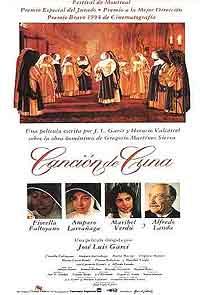 José Luis Garci (Madrid, 1944), dará comienzo con su presencia al ciclo de cine sobre su obra que organiza a partir de mañana el Instituto Cervantes de Dublín. Durante la primera sesión, se proyectará la película Canción de cuna , a partir de las 6 de la tarde en nuestro Café Literario.
José Luis Garci (Madrid, 1944), dará comienzo con su presencia al ciclo de cine sobre su obra que organiza a partir de mañana el Instituto Cervantes de Dublín. Durante la primera sesión, se proyectará la película Canción de cuna , a partir de las 6 de la tarde en nuestro Café Literario.
La acción de Canción de cuna transcurre a finales del siglo XIX, cuando un grupo de monjas encuentra abandonado a un bebé en las puertas de su convento. Este hecho romperá con la rutina de la institución en la que destaca la relación existente entre el doctor del pueblo (Alfredo Landa) y la madre priora. Adoptada por las monjas, Teresa (Maribél Verdú) crecerá como una más de ellas, pero un día aparece Pablo dispuesto a casarse con Teresa…
Instituto Cervantes brings a film series of José Luis Garci (Madrid, 1944), presented by the director, who will join us in this first session. The film Lullaby will be screened today at 6pm at Café Literario.
n the late 19th century a group of nuns finds an abandoned baby girl at the doorstep of their convent. This fact breaks with the routine of the convent which is distinguished by the relationship between the village doctor (Alfredo Landa) and the prioress. Adopted by the nuns, Teresa (Maribél Verdú) will grow as one of them; but one day sees the arrival of Pablo who wants to marry Teresa…
Taller bebidas mexicanas: El mezcal | Mexican Spirits Workshop: Mezcal
 Hoy, a partir de las seis de la tarde, podrás participar en un taller sobre las bebidas mexicanas, más concretamente sobre el Mezcal, y su degustación. No olvides hacer tu reserva en reservas.dublin@cervantes.es.
Hoy, a partir de las seis de la tarde, podrás participar en un taller sobre las bebidas mexicanas, más concretamente sobre el Mezcal, y su degustación. No olvides hacer tu reserva en reservas.dublin@cervantes.es.
Desde 1998, la Asociación Pro Cultura Mezcal A.C., investiga, estudia y difunde la cultura del mezcal, un ancestro venerable de la gastronomía mexicana y una de las formas más puras de alcohol que existen en el mundo para el consumo humano.
El propósito de este taller es: cata y formación.
Cata: Mezcal blanco.
Formación: Cómo beber mezcal.
Dicen los expertos que el mezcal es afrodisíaco, una bebida mística, mágica y asombrosa, que si se ingiere con mesura, es una bebida que estimula, que ahuyenta la negatividad, hace crecer la imaginación, hace olvidar los resentimientos, acompaña en la soledad y que ayuda a ver el mundo simplemente como un lugar mejor.
Esta tarde, esperamos poder conocer uno de los secretos mejor guardados de la gastronomía mexicana.
 Do you want to know more about Mezcal, one of the traditional spirits from Mexico? You can participate in a workshop about this drink today at 6pm at Café Literario. Don´t forget to make your reservation: reservas.dublin@cervantes.es
Do you want to know more about Mezcal, one of the traditional spirits from Mexico? You can participate in a workshop about this drink today at 6pm at Café Literario. Don´t forget to make your reservation: reservas.dublin@cervantes.es
Since 1998, The Association for Mezcal Culture, A.C, has been studying, researching and promoting the culture of a venerable ancestor of the Mexican gastronomy, mescal, one of the purest forms of alcohol that exists in the world for human consumption.
The purpose of this workshop is: Tasting and educating.
Tasting: Silver Mezcal
Educating: How to Drink Mezcal
Experts say mezcal is a mystic, magic aphrodisiac and an extraordinary drink. When drunk with measure, it wakes the spirit, tames enmity, stimulates imagination, clears resentments, accompanies solitude, and makes the world seem just… a little better.
We look forward to know better one of the best kept secrets of the Mexican gastronomy.
